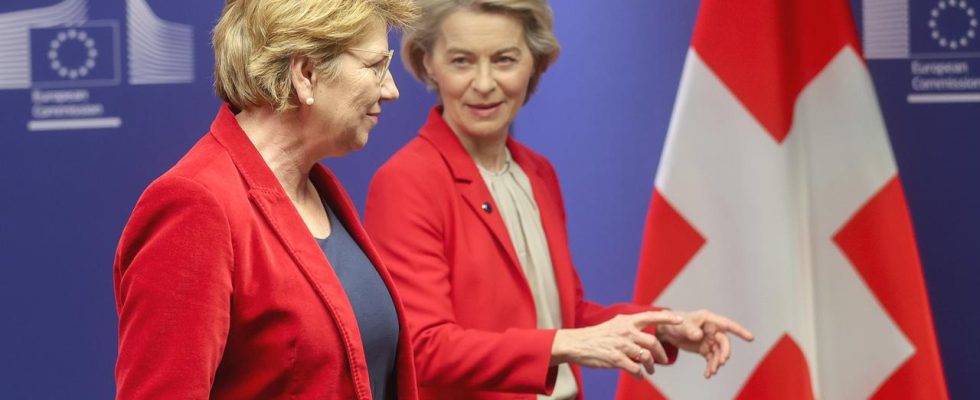Three years ago, Switzerland collapsed negotiations with the EU. Now a new attempt is starting – with concessions from Brussels. However, a fiery commitment to the most important trading partner is not to be expected.
It’s a new attempt. Starting today, official negotiations will begin again between the European Union and Switzerland, which is located in the middle of Europe but is not a member – neither in the EU nor in the EEA, the European Economic Area. Switzerland, whose by far most important trading partner is the European Union, and which, according to a Bertelsmann study from 2019, benefits from the EU internal market like no other country.
Now the government wants to further develop its relationship with the EU, said Swiss Foreign Minister Ignazio Cassis: “In an increasingly unstable world, it is crucial to have stable and secure relations with neighboring countries.” It wasn’t even three years ago that Bern sent a completely different signal to Brussels.
Suddenly, the Swiss government canceled an institutional framework agreement that had been negotiated for years. It should lay down overarching rules for the over 100 bilateral agreements between the EU and Switzerland.
People in Brussels were quite upset about the Swiss exit and have since forgone new contracts with Switzerland – existing ones have no longer been updated. Among other things, Switzerland was kicked out of the important “Horizon Europe” research program. Not a good situation, neither for Switzerland nor for the EU. And so, after months of ice age, they moved towards each other again.
EU is accommodating Switzerland
There is no longer any talk of a framework agreement – the EU has agreed to include the overarching rules in the individual agreements on Switzerland’s access to the internal market. New ones are also to be added, such as an electricity agreement.
Christa Tobler, professor of European law at the University of Basel, believes that the EU has clearly accommodated Switzerland. She is quite optimistic that a clear result will be achieved in the negotiations: “I actually assume that the federal government will then be able to get behind it. What we don’t know with much certainty is how Parliament will then respond.”
What is already certain: The right-wing populist Swiss People’s Party (SVP) is torpedoing the negotiations and is already loudly preparing for the referendum, which will ultimately decide whether it is a success or a flop – whatever the outcome of the negotiations will be.
Switzerland is welcomed in front of the headquarters of the EU Commission in Brussels.
Right-wing populists expressly against negotiations
Group leader Thomas Aeschi said the SVP had opened the vote “against institutional subjugation to the European Union. It will be the most important vote in this century for Switzerland.” If the Swiss people were to agree to this, they would be giving up their freedom and self-determination.
The national conservatives rail against what they call “foreign judges”, i.e. the role of the European Court of Justice (ECJ). As a participant in the EU internal market, Switzerland should adopt changes to EU law. That’s what the EU wants. In the event of disputes, there should be an arbitration tribunal in which Switzerland and the EU are represented, but which will, if necessary, refer to ECJ case law.
Fear of wage dumping in Switzerland
“I hope we find a solution for dynamic legal adoption,” says Cédric Wermuth, co-president of the Swiss Social Democratic Party (SP). However, like the unions, he fears the danger of wage dumping and that wage protection, which works well and is efficient, would be partially called into question. “We cannot have a European policy if people are not sure that their wage levels will be protected. And that is massively higher than in the surrounding countries.”
Apart from the national conservative SVP, all Swiss parties emphasize that they “welcome” the new negotiations with the EU – but it is usually only a lukewarm “yes, but”. A mistake, says European law expert Tobler: “Finding an agreement would also help to secure the current level of prosperity that we have. Because we owe the current good situation to a very large extent to the good relations with our largest neighbor. ” It is essential to move forward because we are surrounded by the EU and the European Economic Area.
Kathrin Hondl, ARD Geneva, tagesschau, March 18, 2024 11:48 a.m

